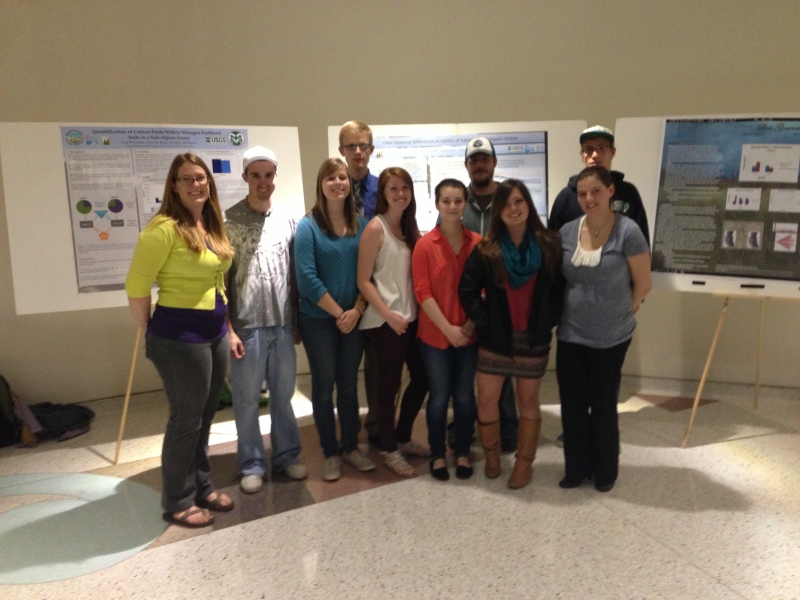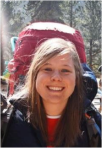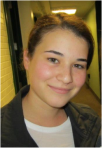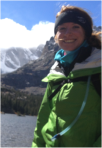
Undergraduates participate in NREL research through SUPER program

NREL‘s brand new Skills for Undergraduate Participation in Ecological Research (SUPER) program just completed its first year. The SUPER program provides opportunity for undergraduate students to participate in ecological research: the undergraduates first learn research skills, from critical thinking to presenting data, then apply what they learned to actual research done by a mentor. The first cohort of the SUPER program completed the year and presented their research at a poster session in May.
“Once the students were involved in hands-on research, their ability to think critically about science blossomed.” – Jessica Earnakovich, SUPER program director
“The students were very dedicated, and they made great strides towards understanding how real scientific exploration is done, far beyond the cookbook experiments of general science courses. Once the students were involved in hands-on research, their ability to think critically about science blossomed. I was most impressed with how they learned the concept and gained the skill to translate their hypotheses into graphical representations.” said program director Jessica Earnakovich.
 Adrian Bailey is a sophomore studying zoology. She is working with GDPE graduate student Kevin Blecha studying the eating habits of mountain lions west of the Denver metropolitan area. Multiple lions have been spotted in cities just outside Denver, and Bailey has been analyzing photos and landscape data that Blecha collected in order to determine why the lions have been so close to the urban areas. This research is important both for public safety, and for the management and safety of the mountain lion population. Bailey plans on working with big cats in her future career, and believes this experience is rewarding in many ways.
Adrian Bailey is a sophomore studying zoology. She is working with GDPE graduate student Kevin Blecha studying the eating habits of mountain lions west of the Denver metropolitan area. Multiple lions have been spotted in cities just outside Denver, and Bailey has been analyzing photos and landscape data that Blecha collected in order to determine why the lions have been so close to the urban areas. This research is important both for public safety, and for the management and safety of the mountain lion population. Bailey plans on working with big cats in her future career, and believes this experience is rewarding in many ways.
Checkout Baily’s research on mountain lion eating habits.
 Austin Broberg is a second year undergraduate studying biological science. He is currently working with USGS Ecological Research Technician Gregory Wann studying a population of white-tailed ptarmigans (an alpine bird) at Mt. Evans. He is working with long-term data collected over the past 50 years on the locations of these birds and is investigating whether, over time, the birds have been moving up the mountain in response to rising annual temperatures. This research is important in the general understanding of the effects of global climate change on species confined to a small area and at risk of extinction.
Austin Broberg is a second year undergraduate studying biological science. He is currently working with USGS Ecological Research Technician Gregory Wann studying a population of white-tailed ptarmigans (an alpine bird) at Mt. Evans. He is working with long-term data collected over the past 50 years on the locations of these birds and is investigating whether, over time, the birds have been moving up the mountain in response to rising annual temperatures. This research is important in the general understanding of the effects of global climate change on species confined to a small area and at risk of extinction.
Check out what Austin found out on ptarmigans.
 Jed Davis is an undergrad at CSU who is majoring in environmental health and conducting research under the guidance of CSU Post Doctoral Fellow Rod Simpson. Through their investigations, Davis and Simpson reinforced their understanding of the carbon cycle within arctic climates. Their goal was to understand if and when carbon is leaving the soil. They accomplished this by analyzing the amount of carbon in soil and plant material from 1986 and 2012 and comparing the two. They discovered that carbon amounts in the soil are decreasing and increasing in plants. Using this knowledge they can make better predictions of the amount of carbon released by the soil in the future.
Jed Davis is an undergrad at CSU who is majoring in environmental health and conducting research under the guidance of CSU Post Doctoral Fellow Rod Simpson. Through their investigations, Davis and Simpson reinforced their understanding of the carbon cycle within arctic climates. Their goal was to understand if and when carbon is leaving the soil. They accomplished this by analyzing the amount of carbon in soil and plant material from 1986 and 2012 and comparing the two. They discovered that carbon amounts in the soil are decreasing and increasing in plants. Using this knowledge they can make better predictions of the amount of carbon released by the soil in the future.
See Jed’s research on Arctic soil and carbon cycling.
 Catherine de Vlaming is an undergraduate studying conservation biology and fisheries. She is working with NREL Research Scientists Randall Boone to study how chronic wasting disease, a disease similar to mad cow disease that affects mule deer in the Front Range of Colorado, spreads. At the moment, some deer are getting the disease while others are not, and the reason for this is not known. Vlaming is analyzing mule deer genes to see if genetic relatedness and/or geological location are factors in the spread of the disease, and hopes her work will help discover the answer.
Catherine de Vlaming is an undergraduate studying conservation biology and fisheries. She is working with NREL Research Scientists Randall Boone to study how chronic wasting disease, a disease similar to mad cow disease that affects mule deer in the Front Range of Colorado, spreads. At the moment, some deer are getting the disease while others are not, and the reason for this is not known. Vlaming is analyzing mule deer genes to see if genetic relatedness and/or geological location are factors in the spread of the disease, and hopes her work will help discover the answer.
See Catherine’s research on chronic wasting disease.
 Nevin Klein is an undergraduate studying wildlife biology who has been assisting GDPE Ph.D. candidate Katie Langin with her conservation work of the Island Scrub Jay, a bird native to Santa Cruz Island, California. Given the vulnerability of this bird, Langin and Klein strive to apply the study of evolution to the conservation of the species in order to maintain a stable population for future generations.
Nevin Klein is an undergraduate studying wildlife biology who has been assisting GDPE Ph.D. candidate Katie Langin with her conservation work of the Island Scrub Jay, a bird native to Santa Cruz Island, California. Given the vulnerability of this bird, Langin and Klein strive to apply the study of evolution to the conservation of the species in order to maintain a stable population for future generations.
See Nevin’s research on scrub jay.
 Brittany Messinger is an undergraduate studying wildlife biology. She is working with GDPE Ph.D. candidate Kelly Hopping, who is researching Tibetan Plateau ecology. Messinger is researching the affect that pikas, a mountain-dwelling rodent, are having on both soil nutrients and on plant composition. Pikas are viewed as a pest species in Tibet, much like the American prairie dog, and are being eradicated from the plateau. Messinger hopes her research will bring a better understanding of the positive role pikas play in the Tibetan ecosystem and support wildlife management policy for the pikas. Through SUPER, Messinger has found an interest in wildlife policy.
Brittany Messinger is an undergraduate studying wildlife biology. She is working with GDPE Ph.D. candidate Kelly Hopping, who is researching Tibetan Plateau ecology. Messinger is researching the affect that pikas, a mountain-dwelling rodent, are having on both soil nutrients and on plant composition. Pikas are viewed as a pest species in Tibet, much like the American prairie dog, and are being eradicated from the plateau. Messinger hopes her research will bring a better understanding of the positive role pikas play in the Tibetan ecosystem and support wildlife management policy for the pikas. Through SUPER, Messinger has found an interest in wildlife policy.
Check out what Britteny found out about pikas in Tibet.
 Lauren Mittman is a freshman majoring in political science with an interest in environmental science. She is a mentee of Katie Renwick, a GDPE graduate student. Mittman has been assisting Renwick in mapping changes of forest composition in Rocky Mountain National Park that have occurred between the years of 1992 and 2012. Her goal is to find out if tree crowding negatively affects tree ability to survive an increase in mountain pine beetle attacks which may be a result of climate change. This may help predict future outbreaks and help to ensure that forests can withstand expected increases in mountain pine beetle attacks.
Lauren Mittman is a freshman majoring in political science with an interest in environmental science. She is a mentee of Katie Renwick, a GDPE graduate student. Mittman has been assisting Renwick in mapping changes of forest composition in Rocky Mountain National Park that have occurred between the years of 1992 and 2012. Her goal is to find out if tree crowding negatively affects tree ability to survive an increase in mountain pine beetle attacks which may be a result of climate change. This may help predict future outbreaks and help to ensure that forests can withstand expected increases in mountain pine beetle attacks.
See Lauren’s study on pine trees and mountain pine beetle.
 Chris Throssel is a sophomore fish, wildlife and conservation biology major working with Ecologist Ed Hall at NREL. He is researching the effects of nitrogen pollution on the functions of microbes in the Loch Vale watershed of Rocky Mountain National Park. Microbes decompose organic matter, a function which releases greenhouse gasses from the soil. This vital ecosystem function may be perturbed by airborne N pollution from CO’s Front Range. Throssel plans to study the inner workings of a small, but significant, part of the ecosystem with a goal to gain a greater understanding of the vast complexities of Rocky Mountain National Park ecology.
Chris Throssel is a sophomore fish, wildlife and conservation biology major working with Ecologist Ed Hall at NREL. He is researching the effects of nitrogen pollution on the functions of microbes in the Loch Vale watershed of Rocky Mountain National Park. Microbes decompose organic matter, a function which releases greenhouse gasses from the soil. This vital ecosystem function may be perturbed by airborne N pollution from CO’s Front Range. Throssel plans to study the inner workings of a small, but significant, part of the ecosystem with a goal to gain a greater understanding of the vast complexities of Rocky Mountain National Park ecology.
Check out Chris’ research on microbes in Loch Vale.
 Lisa Windom is a chemistry major with a particular interest in soil chemistry. Windom is working with CSU Post-Doctoral Associate Claudia Boot, and is researching the effect of nitrogen pollution on the amount of carbon stored in soil. Her contribution to this project is to measure the amount of carbon and nitrogen within the soil to address the hypothesis that increased nitrogen in the atmosphere, resulting from urbanization and agriculture, will decrease the amount of carbon stored in the soil by increasing the release of carbon as carbon dioxide. Gaining a better understanding of the release of carbon dioxide from soil could play an important role in solving complex climate change issues.
Lisa Windom is a chemistry major with a particular interest in soil chemistry. Windom is working with CSU Post-Doctoral Associate Claudia Boot, and is researching the effect of nitrogen pollution on the amount of carbon stored in soil. Her contribution to this project is to measure the amount of carbon and nitrogen within the soil to address the hypothesis that increased nitrogen in the atmosphere, resulting from urbanization and agriculture, will decrease the amount of carbon stored in the soil by increasing the release of carbon as carbon dioxide. Gaining a better understanding of the release of carbon dioxide from soil could play an important role in solving complex climate change issues.
See what Lisa found on nitrogen pollution and soil carbon.
Want to know more?
SUPER is a two semester program open to all CSU undergraduate students. You can find more information by visiting the SUPER website.